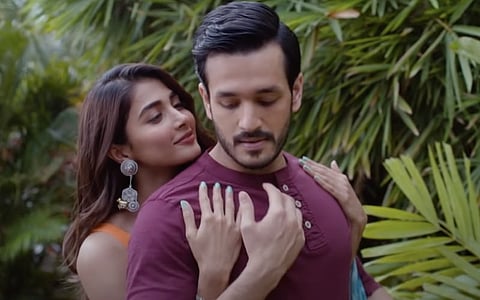
- In-Depth Stories
- Web Stories
- Reviews
- News
- FC Lists
- Interviews
- Features
- FC SpecialsFC Specials

Director: Baskar
Cast: Akhil Akkineni, Pooja Hegde, Eesha Rebba, Faria Abdullah, Murali Sharma, Vennela Kishore, Jayaprakash
Language: Telugu
Bommarillu Baskar's Most Eligible Bachelor wants to be both a family entertainer and a film with youth appeal. It speaks for considering the desires of one's family and the need for togetherness on one hand, while also asking us to embrace the hero's individualism on the other. In oscillating between the two, the film doesn't find its home in either.
Romantic comedy is a fraught genre because there is little one can do to be surprising or unpredictable — after all, the leads need to live happily ever after in the end. Even by those standards, Baskar's writing is stale. The opening credits are rolled alongside married-couples-are-unhappy-individuals jokes. Take this, for instance: Adhrushtam unna vallani emi antaru? Unmarried antaru! (What do you call a lucky person? You call them unmarried!).
If we're not already prepared for what to expect, we soon meet Harsha (Akhil Akkineni) who narrates his story to a couple that accidentally hits him with their car. He has a great job in the U.S., a big salary, big house, a big set of friends and most of all a respectable family. All of this makes him the most eligible bachelor and every woman back in India is expected to be pining over him. The film isn't going for subtlety — Harsha repeats that over and over again in the first sequence.

He comes to India for twenty days with all the arrangements for his wedding in place except, naturally, the bride. The pellichoopulu (bride-seeing ceremonies) begins. He just needs one thing from his prospective wife: Will she adjust her lifestyle to his? To test women, he asks questions ranging from "whose parents will you take care of better?" to "who will take care of our child if we are both busy?" There are some jokes here and there, but the film is steadfastly on Harsha's side.
In this process, Harsha meets Vibha (Pooja Hegde), a free spirited standup comedian whose views on marriage are very different from his. She says audacious things like wanting to actually know the person she wishes to marry and expects her marriage to have love and romance. To her, Harsha is not an eligible bachelor at all. To no one's surprise, Harsha falls in love with Vibha. The rest is cliche-filled and tiresome.
For example, the stalker-turns-lover cliche: Vibha who is initially annoyed at Harsha, a stranger stalking her, becomes impressed when he chases away goons at a film theater, and later beats up a man who tries to assault her. There's the men-will-tell-women-what-to-do cliche: At one point, Harsha promises Vibha's mother that she will return home when she, in fact, has left out of her own volition. There is even a backhanded trial of a woman's character while we're watching the man stand in court.
The problem isn't so much that these scenes/cliches exist but that they go entirely unquestioned. Vibha ends up falling in love with her stalker. She ends up listening to men telling her what to do. The film wants us to think that Harsha's redemption is in embracing Vibha's individualism, but it doesn't quite work out that way.

To be fair, the director does put Harsha through a period of internal conflict and soul searching. His ideas of marriage are questioned. In a montage over several months, he becomes a person who enjoys life more. He begins to think that there might be more to a marriage than simply making a family. But even then, his agenda is still to get married and make a family. Just this time, more happily.
Beyond Harsha and Vibha, there is little going on in the film. In fact, we don't even understand much about why they are the way they are. The film expects us to take them at face value, without empathising with their story. It doesn't explore the idea of marriage beyond the one-line: family vs. romance. Even in that, it does nothing new. The filmmaking is so stale that we get fast-cuts to reactions and speeding up of frames to evoke laughter.
Most Eligible Bachelor is old wine in an older bottle. Even with that call-back to Bommarillu in the end, Most Eligible Bachelor has nothing redeemable about it. It strings together tedious cliches and dated ideas to say next to nothing.